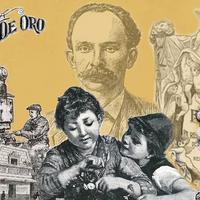La galería de las máquinas
Die Galerie der Maschinen
The gallery of machines
La galerie des machines
기계 갤러리
Галерея машин
Galleriet av maskiner
Makineler galerisi
Los niños han leído mucho el número pasado de La Edad de Oro , y son graciosas las cartas que mandan, preguntando si es verdad todo lo que dice el artículo de la Exposición de París .
The children have read the past number of The Golden Age a lot, and the letters they send are funny, asking if everything that the article on the Paris Exposition says is true.
Por supuesto que es verdad.
Of course it's true.
A los niños no se les ha de decir más que la verdad, y nadie debe decirles lo que no sepa que es como se lo está diciendo, porque luego los niños viven creyendo lo que les dijo el libro o el profesor, y trabajan y piensan como si eso fuera verdad, de modo que si sucede que era falso lo que les decían, ya les sale la vida equivocada, y no pueden ser felices con ese modo de pensar, ni saben como son las cosas de veras, ni pueden volver a ser niños, y empezar a aprenderlo todo de nuevo.
Children should not be told more than the truth, and nobody should tell them what they do not know is what they are saying, because then the children live believing what the book or the teacher told them, and they work and think as if that were true, so if it happens that what they were told is false, they already get the wrong life, and they can not be happy with that way of thinking, nor do they know how things really are, nor can they return to Be children, and start learning everything again.
¿Que si es verdad todo lo de la Exposición?
What if everything about the Exhibition is true?
Una señora buena le armó una trampa al hombre de La Edad de Oro .
A good lady set a trap for the man of The Golden Age.
Iban hablando del artículo, y ella le dijo: «Yo he estado en Paris.» «¡Ah, señora, qué vergüenza entonces!
They were talking about the article, and she said: "I've been in Paris." "Oh, ma'am, what a shame then!
¡qué habrá dicho del artículo!» «No: yo he estado en París, porque he leído su artículo.»Y otro señor bueno, que está en París, dice «que a él no lo engañan, que La Edad de Oro estuvo en París sin que él la viera, porque él se pasaba la vida en la Exposición y todo lo que había en la Exposición que ver está en La Edad de Oro .»
What will he say about the article! "" No: I've been in Paris, because I read your article. "And another good gentleman, who is in Paris, says" that he is not deceived, that the Golden Age was in Paris without him seeing it, because he spent his life in the Exhibition and everything that was in the Exhibition to see is in The Golden Age. "
Pero el señor bueno dice que faltó un grabado, para que los niños vieran bien toda la riqueza de aquellos palacios; y es el grabado de la «Galería de las Máquinas», que era el corredor adonde daban las puertas diferentes de las industrias del mundo, y allá al fondo tenía el edificio más hermoso, donde estaban en hilera, como elefantes arrodillados, las máquinas de todo lo que el hombre sabe hacer.
But the good gentleman says that an engraving was missing, so that the children could see well all the wealth of those palaces; and it is the engraving of the "Gallery of Machines", which was the corridor where the different doors of the industries of the world were given, and there in the background it had the most beautiful building, where they were in a row, like kneeling elephants, the machines of everything that man knows how to do.
Quien ha visto todo aquello, vuelve diciendo que se siente como más alto.
Who has seen all that, returns saying that it feels like higher.
Y como La Edad de Oro quiere que los niños sean fuertes, y bravos, y de bueno estatura aquí está, para que les ayude a crecer el corazón, el grabado de La Galería de las Máquinas.
And as The Golden Age wants children to be strong, and brave, and of good stature here it is, to help them grow the heart, the engraving of The Gallery of Machines.

